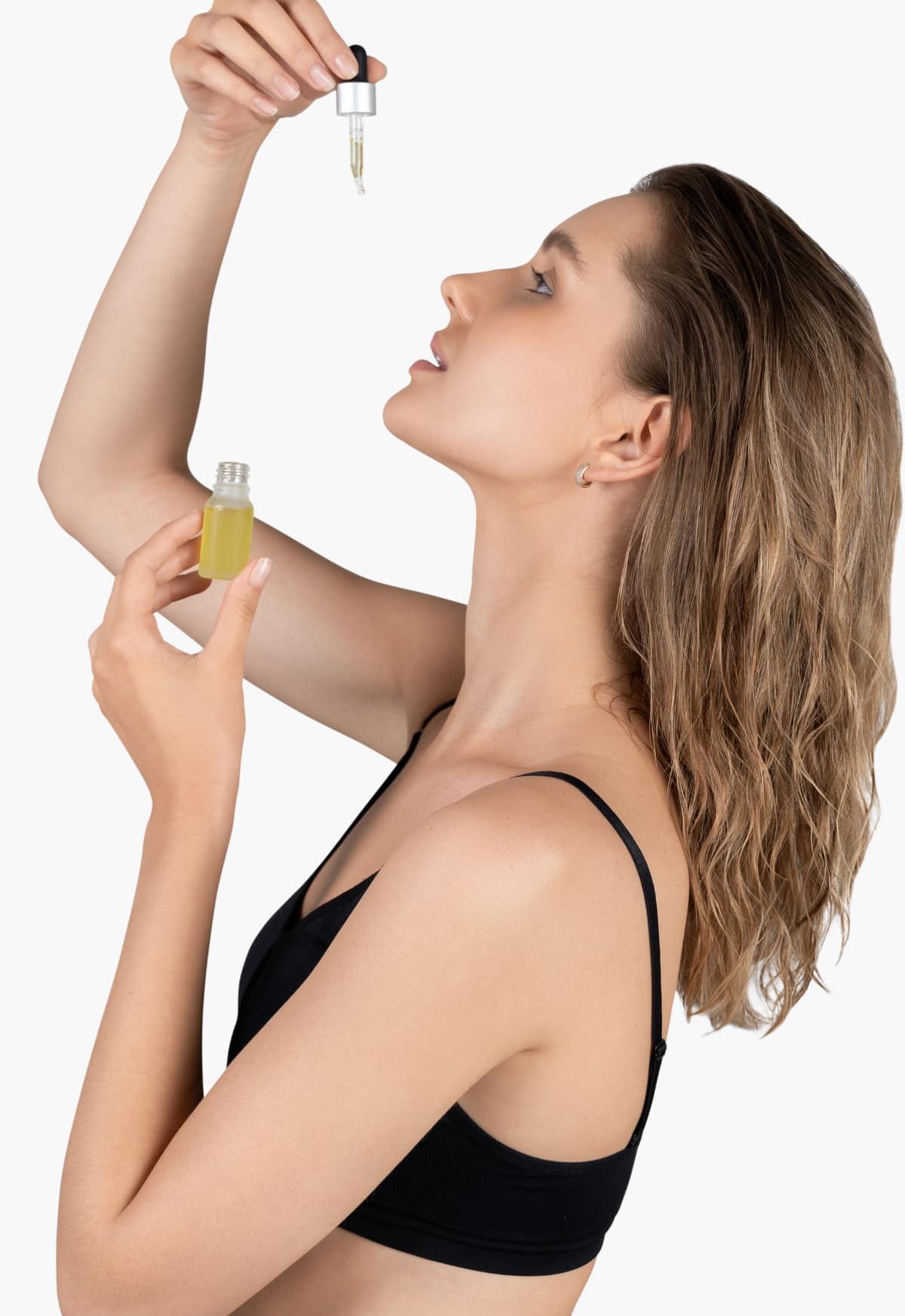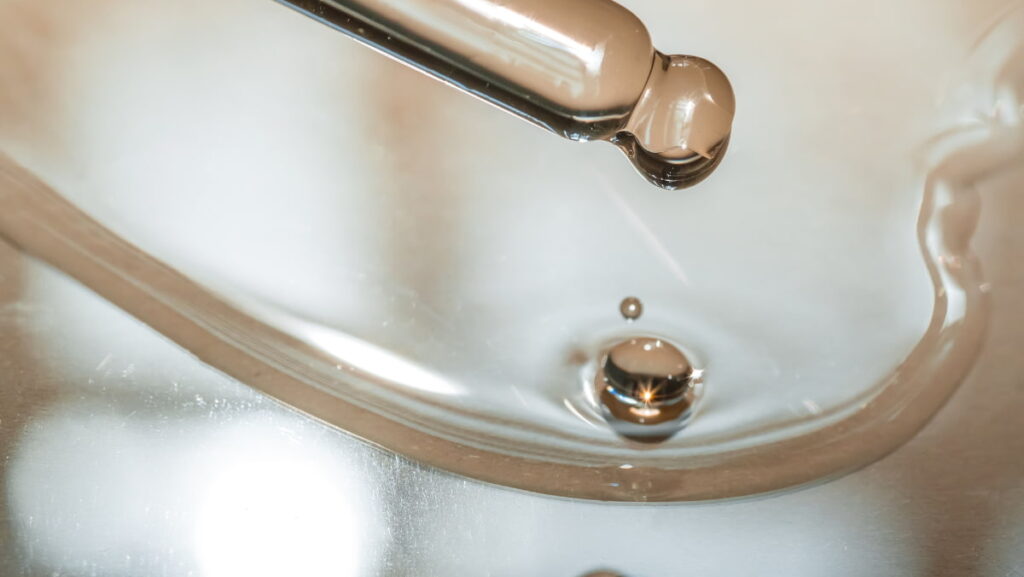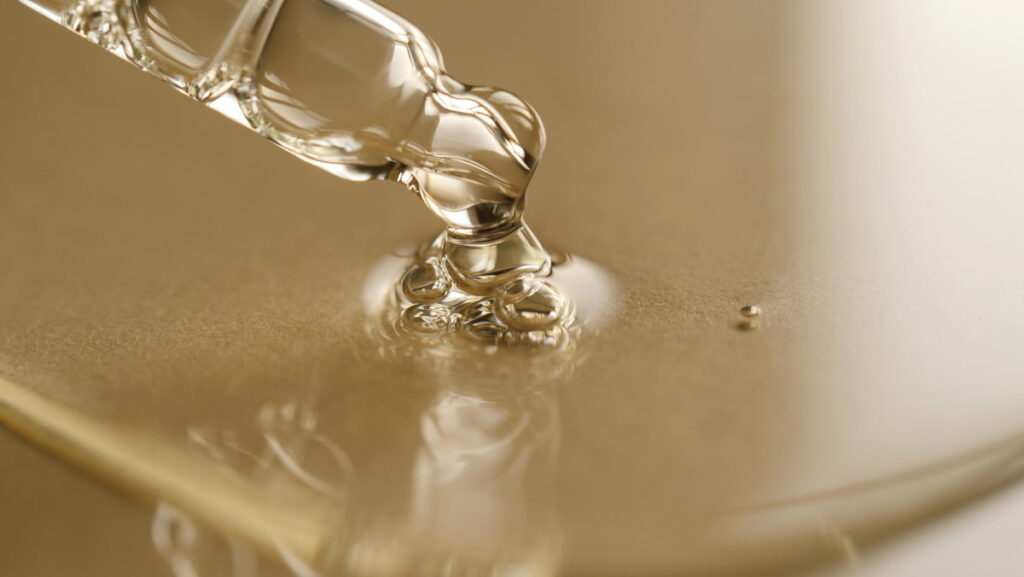
Does your skin often feel dry, dull, or need a little extra TLC? Squalane might just be the savior your skincare routine has been missing.
Squalane is naturally produced in our bodies, and we can also extract it from natural resources like olives and rice bran. It is a lightweight, non-greasy lipid miming your skin’s natural sebum. It offers an array of benefits that could answer your skin woes.
You might be wondering, what does squalane do for skin? Well, it’s time to discover the secrets behind this wonder ingredient.
Squalane is a powerful emollient that provides deep hydration, but that is not the whole story. After all, an increasing number of skincare products harness its power, for a good reason.
So, if you’re keen on rejuvenating and maintaining your skin’s natural balance, read on to discover the magical benefits of squalane.

What Is Squalene?
Before I answer the question, “What does squalane do for skin?” I have to explain what squalene is to the people in the back unfamiliar with the ingredient.
Why squalene and not squalane, you ask. I’ll save the answer for later…
Squalene is a naturally occurring lipid found in plants, animals, and humans—with its highest concentrations being found in sebum (the oily substance produced by our pores).
Squalene naturally occurs in your skin, with the highest concentration found in newborns. Sadly, past 30, these levels drop, which can result in a loss of elasticity, increasing the appearance of fine lines and wrinkles. Fortunately, applying squalane topically can counteract its natural decrease.
It’s an incredibly lightweight oil with a silky texture that absorbs quickly into the skin without leaving behind any greasy residue. As a result, squalene has become increasingly popular among those looking for effective yet gentle skincare solutions.
In recent years, scientists have been able to synthesize squalene from sources like olives or wheat germ.
The most abundant source of squalene is shark liver (!), where it got its name. Unfortunately, in previous years sharks were killed to harvest the product. Now, most squalane products contain 100% plant-sourced squalene.
Pro tip: Look for indications like vegan, plant-sourced, etc., to ensure your beauty product is ethically sourced.
Squalane vs. Squalene: What sets them apart?
Wait, are squalane and squalene any different? Well, technically, they are.
Squalene is a natural compound produced by your body, found in your skin’s sebum, and helps moisturize your skin.
However, it can be unstable on the skin, particularly when exposed to air and light. When squalene undergoes oxidation, it can turn into squalene peroxide, which is potentially irritating and comedogenic.
On the other hand, squalane is a more stable, hydrogenated version of squalene, which means it’s less prone to oxidation and has a longer shelf life. Win-win!
The 7 Benefits Of Squalane For The Skin
Now that you have become a pro in telling squalene and squalane apart let’s explore the latter’s benefits in skincare.
You’ll be surprised to learn that many compare squalane with hyaluronic acid. Why, you ask, what does squalane do for skin? Well, voila:
1. Squalane Is A Powerful Emollient
Squalane is a wonderful natural moisturizer absorbed deep into your skin quickly and efficiently.
Due to its similarity with natural sebum, squalane can easily penetrate the skin’s surface and deliver beneficial nutrients deep within
It restores your skin’s healthy suppleness and flexibility without leaving an oily feeling.
2. Squalane Is A Potent Hydrator
Hydration lock is an essential property of squalane, as it is a skin barrier. It keeps water molecules in the skin, preventing evaporation and eventually transepidermal water loss (TEWL).
Squalane helps maintain hydration and elasticity for a supple, healthy complexion by holding onto moisture.
3. Squalane Has Radical Antioxidant Powers
With its antioxidant properties, squalane helps to neutralize free radicals and protect your skin from environmental stressors.
Squalane acts as a barrier, protecting your skin against environmental stressors like pollution and UV radiation. This shielding effect can keep your complexion looking healthy, even as you spend time outdoors.
Free radicals are unstable molecules that can cause oxidative stress, leading to cellular damage and premature aging. Squalane’s antioxidant properties help to neutralize these harmful particles, ensuring your skin remains youthful and radiant.
4. Squalane Is Anti-inflammatory
Squalene has impressive anti-inflammatory effects, which can help reduce inflammation in the body. These properties make it valuable in supporting the immune system and calming immune responses.
While squalene’s systemic anti-inflammatory effects are well-documented, further research is needed to determine its specific impact on skin inflammation and its potential benefits for soothing and protecting the skin.
5. Squalane May Help In The Anti-aging Process
Due to its powerful antioxidant properties, squalane combats free radicals, defending your skin against environmental aggressors like pollution and UV rays.
Oxidative stress accelerates the breakdown of collagen and elastin, two essential proteins that maintain skin firmness and elasticity. Antioxidant-rich ingredients like squalane can be potential allies for retaining your youthful glow.
6. Squalane Aids In Oil Regulation
Due to its composition and natural origin, squalane closely mimics your skin’s natural lipids. It’s similar in structure to sebum, the oil your skin naturally produces.
Because of this, applying squalane can help regulate sebum production, meaning your skin is less likely to produce excessive amounts of oil – one of the main culprits behind clogged pores.
7. Squalane Pairs Well With Other Actives
In addition to its stand-alone powers, squalane also plays well with other skincare ingredients.
Thanks to its molecular structure, squalane can easily penetrate the skin’s surface on a deeper level. This ability to enhance penetration ensures that other active ingredients in your skincare products are working at their maximum potential.
Squalane, therefore, ensures that your skin reaps the full benefits of your routine. For example, blending squalane with retinol can reduce the typical irritation associated with retinol while maximizing its anti-aging effects.
Who Should Use Squalane
Squalane is a very adaptable ingredient that satisfies a multitude of skin types. From sensitive to dry skin, this versatile ingredient caters to everyone:
- Sensitive skin: Squalane is considered a non-irritating emollient compatible with even the most sensitive skin types.
- Dry skin: Possessing a remarkable ability to lock in moisture, squalane alleviates flakiness and soothes parched skin.
- Oily skin: Thanks to its lightweight and non-comedogenic nature, squalane provides hydration without clogging pores or causing breakouts.

Does Squalane Clog Pores?
Squalane is generally considered non-comedogenic, meaning it is less likely to clog pores. However, it’s important to note that the comedogenic rating of a substance can vary depending on the individual’s skin type and sensitivity.
Squalane has a low comedogenic rating of around 0 to 1 on a scale of 0-5. This means squalane is non-comedogenic. A breakdown of the scale is as follows:
| Rating | Description |
| 0 | Will not clog pores |
| 1 | Low likelihood of clogging pores |
| 2 | Moderately low probability of clogging pores |
| 3 | Moderate probability of clogging pores |
| 4 | Fairly high likelihood of clogging pores |
| 5 | High likelihood of clogging pores |
It is considered a lightweight, non-greasy moisturizing ingredient that mimics the natural oils the skin produces. Therefore, it is generally well-tolerated and suitable for various skin types, including acne-prone or sensitive skin.
However, it’s important to consider the product’s formulation and other ingredients used alongside squalane. Sometimes, skincare products may contain additional ingredients that can contribute to pore-clogging or acne breakouts.
If you have specific concerns about a particular product or if you have a history of skin sensitivity or acne, it’s always a good idea to perform a patch test or consult with a dermatologist before incorporating new skincare products into your routine.
The Side Effects Of Squalane For The Skin
Now that we have explored what squalane does for skin, we can agree that it is indeed a powerhouse ingredient.
However, it’s important to note that the potential side effects of squalane can vary depending on the source and the individual’s skin sensitivity. Here are some possible side effects associated with squalane use on the skin:
- Skin Irritation: In some cases, squalane can cause skin irritation, especially in individuals with sensitive skin. This may manifest as redness, itching, or a rash.
- Allergic Reactions: While rare, allergic reactions to squalane can occur in some individuals. Symptoms may include itching, hives, swelling, or difficulty breathing. If you suspect an allergic reaction, discontinue use and seek medical attention.
- Sensitivity to Sunlight: Squalane itself is not known to cause photosensitivity. However, some squalane products may contain other ingredients (i.e., vitamin A) that can increase the skin’s sensitivity to sunlight, leading to sunburn or other sun-related skin damage. It’s important to check the formulation and usage instructions of the specific product you’re using.
- Contamination Risks: Squalane derived from shark liver oil can potentially contain trace amounts of impurities, including heavy metals or environmental toxins. To mitigate this risk, many skincare brands now use squalane derived from plant sources, such as olives or sugarcane.
It’s worth noting that squalane is generally considered safe for topical use, and most individuals do not experience any adverse effects.
However, as with any skincare product, it’s advisable to perform a patch test before using squalane-based products on a larger area of your skin, especially if you have known sensitivities or allergies.
If you have any concerns or experience persistent side effects, it’s best to consult a dermatologist or healthcare professional for personalized advice.
How To Use Squalane On Face
Incorporating squalane into your daily skincare regimen is a breeze. Many products, ranging from serums to moisturizers, contain this star ingredient as their active component.
Pro tip: Squalane is not only perfect for the face but for the entire body. You can also come across this potent ingredient in body lotions, lip balms, and much more!
If you want more intensive care, search for pure squalane oil to enjoy the benefits of this potent hydrator in its most concentrated form.
Want to know how to use squalane on the face? Here is a quick guide on incorporating it into your daily skincare routine:
- Cleanse your skin: Before applying squalane, clean your skin with a gentle cleanser to remove dirt and excess oils.
- Apply toner: If you like to prep your skin with toner before following up with actives, apply a small amount all over your face and let it dry.
- Apply squalane: Squalane comes in many forms. If you want to use it as your main active ingredient, you should find it in light creams, serums, or oils. Apply squalane evenly on your face and massage gently to activate the ingredient.
- Final touches: Squalane is already a fantastic hydrator, but for an extra boost of moisture, you can follow up with your favorite light moisturizer. If you’re using squalane in your evening routine, consider pairing it with a nourishing night cream. For daytime use, remember the golden rule: never skip sunscreen!
By consistently using squalane in your skincare routine, you’ll soon start to experience its magic in the form of softer, more hydrated skin that’s ready to face the day.
Best Skincare Products With Squalane
- Facetheory Emolliating Olive Squalane O7: This lightweight facial oil is derived from olives and helps to hydrate and soften the skin, leaving it with a radiant and smooth appearance.
- The Ordinary Squalane Cleanser: A gentle and effective cleanser that melts away impurities and makeup while maintaining the skin’s natural moisture barrier, leaving it feeling clean and nourished.
- The Inkey List Squalane Oil: A non-greasy facial oil that deeply moisturizes and soothes the skin, providing a boost of hydration and leaving it feeling soft and supple.
- Biossance Squalane + Hyaluronic Toning Mist: A refreshing mist infused with squalane and hyaluronic acid, it helps to hydrate and plump the skin, prepping it for the next skincare steps.
- Fresh Rose & Squalane Deep Hydration Oil-Infused Serum: A serum that combines the nourishing properties of squalane with the soothing effects of rosewater, delivering deep hydration and promoting a calm, balanced complexion.
- Milk Makeup Sunshine Vitamin C + Squalane Face Oil: Infused with vitamin C and squalane, this face oil protects the skin from environmental stressors while providing a boost of brightening and hydrating benefits.
- Herbivore Pink Cloud Rosewater + Squalane Makeup Removing Face Wash: A gentle face wash infused with rosewater and squalane, it effectively cleanses the skin, removing makeup and impurities without stripping its natural moisture.
- First Aid Beauty Hydrating Toner with Squalane + Oats: This toner combines squalane and oat extract to hydrate and soothe the skin, reducing redness and leaving it feeling refreshed.
- Laneige Water Sleeping Mask with Squalane: A hydrating sleeping mask infused with squalane to lock in moisture overnight, leaving the skin plump and revitalized in the morning.
- Kiehl’s Since 1851 Ultra Facial Moisturizing Cream with Squalane: A rich facial moisturizer that contains squalane, providing long-lasting hydration and helping to strengthen the skin’s moisture barrier.
See all the best squalane skincare products here.
What Does Squalane Do For Skin: A Conclusion
You have reached the end of this ode for one of the most beloved ingredients in skincare. Let’s recap what we’ve learned – What does squalane do for the skin?
It offers excellent moisturizing properties, powerful antioxidant prowess, oil regulation benefits, and so much more. From calming acne to anti-aging, squalane’s benefits are impressive and wide-spectrum.
With all these perks, squalane makes an outstanding addition to your skincare arsenal. So go ahead, give it a try, and watch your skin reap the rewards of this powerful, hydrating ingredient.
Frequently Asked Questions
shop the post
